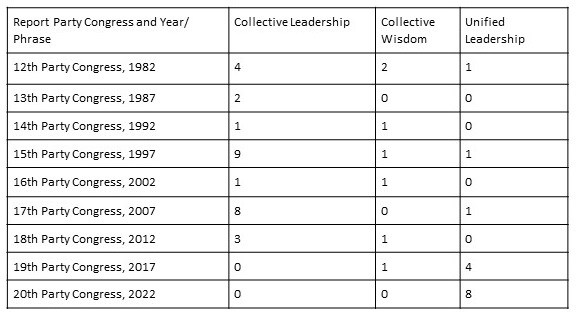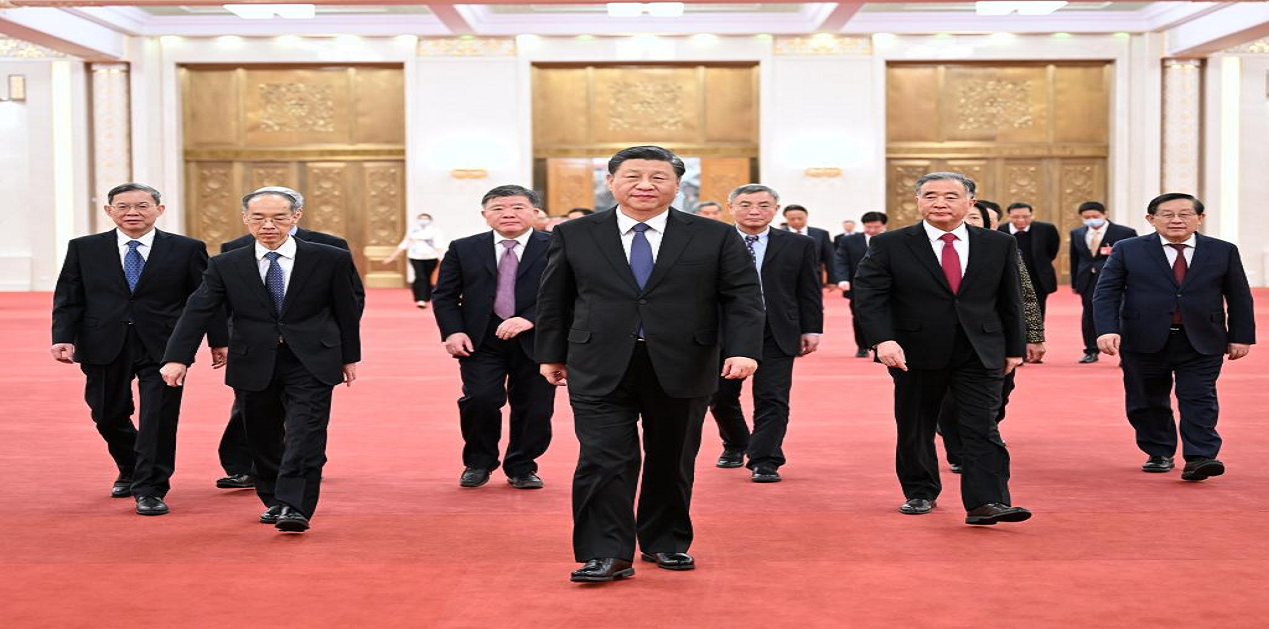Right before the third plenum of the fifth National People’s Congress in 1980, Deng Xiaoping, former Chinese leader-in-charge made a speech ‘On the Reform of the System of Party and State Leadership’.[1] The perspective he presented therein on the institutionalization of norms and regulations regarding the functioning of the Communist Party of China (CPC) proved to be fundamental in guiding the Party under subsequent leaders. Perhaps the most significant and key takeaway of the speech, which is now part and parcel of Party dictum, has been the idea of ‘party-led Collective Leadership’ (Jítǐ lǐngdǎo, 集体领导). Deng essentially substantiated the need for the concept by arguing against the arbitrariness and inefficiency of individualistic, ‘one-man’ rule, and underscoring the importance of “collective wisdom” of the Party in general, and the members of the Central Committee, the leading 376-member organ of the Party, in specific. Because Deng witnessed firsthand the grave consequences of the “over-concentration” of power in the hands of Mao Zedong, former Chairman of the CPC, in the form of the widespread agony caused by the Anti-Rightist Campaign (1957-59), the Great Leap Forward (1958-62) and the Great Proletarian Cultural Revolution (1966-76), his concerns were appreciated, and his pronouncements had gained profound support among party cadres for years to come.
Deng constituted the concept of Collective Leadership and responsibility with the aim of “replacing rule of personality with rule of law and rule of institutions” (Willy Wo-Lap Lam, 2015). Collective Leadership can be understood as a power-sharing arrangement in Chinese elite politics where the leader of the Party is not the sole authority over political, socioeconomic, and military affairs, but merely a “first among equals” on the Politburo and in the Central Committee of the CPC, and is tasked with accommodating consensus between dissenting ideologies and policy ideas. While the core idea that the head of the party is “first among equals” on the PSC, the apex five-to-nine-member leadership body of the CPC, and not an individual of higher authority, was also prevalent during Mao’s leadership, and yet China under Mao was, in every way, a one-man show, with ‘Chairman Mao’ at the helm of affairs. This also explains why Deng’s 1980 address featured a specific discussion on doing away with personality-driven “mass movements” (Qúnzhòng yùndòng, 群众运动) in favour of “solid, systematic measures.”[2]
The consequences of this party reform, supplemented by other key Deng-era reforms such as the separation of party and government (Dǎng zhèng fēnkāi, 党政分开), the institution of a two-term limit on the post of President of the PRC, and the delegation of authority to provincial and local leaders, positively influenced the Party’s ability to mitigate discord against top leadership and settle differences through the creation of a “bi-factional” political arrangement that enabled power sharing between the “elitist” (Jiang-Xi) and the “populist” (Hu-Li/ Communist Youth League) intra-party coalitions (Cheng Li, 2016). Under such an arrangement, the agreement that succession will be determined on a rotational basis between members of the two coalitions, even if not documented, became understood as the convention. This is evidenced by Deng and later Jiang’s endorsements of Hu Jintao for top leadership positions (such as Vice President of PRC in 1998 and Vice Chairman of CMC in 1999), which, as Cheng Li argues, was an indication that he was poised to occupy the post of GS after Jiang (Cheng 2016, p. 52).
However, the system of bi-factionalism, combined with Hu’s subservient personality, also had drastic consequences for the power and position of the General Secretary. While Hu was praised for his systematic resolution to global issues such as the SARS Pandemic of 2003 and the 2008 financial depression, the internal domestic compulsion of having to deal with opposition from the elitist faction on developing macroeconomic control policies to burst the property bubble and introduce an affordable housing policy for low-income families. This is primarily because this coalition represents itself[3] as the mouthpiece of an emerging middle class, concerned only with rapid GDP growth, and receives massive support from crony capitalists and monopolists of State-Owned Enterprises (SOEs), referred to as the “underworld” (Hēishèhuì, 黑社会) or the “black society” of China (Cheng 2016, p. 386). Chen Liangyu, Jiang’s protégé, member of the 16th Politburo and former CPC Secretary of Shanghai (2001-03), provided sustained critique against “conservative”[4] economic policies of the Hu-Wen administration, so as to defend the interests of the Chinese real estate in the long run. As a result, in one of the most high-ranking purges of the time, he was stripped of his positions[5] due to his involvement in a pension funds scandal. Nonetheless, Hu’s tenure remained mired with political controversies and deadlocks over major policy decisions, which is why the phrases such as “the lost decade” [6] and “Policies do not go beyond Zhongnanhai”[7] have become popular, albeit questionable descriptions of this period.
As decentralization[8] under Hu expanded, corrupt generals[9] began to take increasing control over the everyday affairs of the PLA, provincial governments began showing resistance to reforms, and overall party corruption went through the roof. The Bo Xilai crisis[10] of 2012, involving an exposé of the high degree of graft and criminality political elites of the CPC were involved in (with crimes involving murder, sexual assault and bribery), presented accurately the adverse condition of party discipline under a leadership mired by Hu’s “inaction”[11] (wúwéi, 无为). Analysts[12] have further shown that Hu’s inability to break out of Jiang’s influence, as evident from the latter’s occupation of the top post of Chairman of the CPC Central Military Commission for two years even after Hu became GS, as well as the domination of the PSC membership by officials from the ‘elitist’ faction under Hu, added on to the challenge to Hu’s legitimacy at the helm of affairs.
Since Xi Jinping’s ascent to the post of General Secretary of the Central Committee of the CPC in 2012 and to that of President of the People’s Republic of China in 2013, there has been a move away from the idea of Collective Leadership to a more Mao-like centralization of individual authority. To begin with, Xi’s rapid usurpation of power cannot be explained without commenting on his control over party discipline. This is best explained by his forceful anti-graft campaign after coming to power, in collaboration with his Chief Discipline Inspector and anti-corruption “tsar” [13] Wang Qishan, during which the CPC Central Commission for Discipline Inspection indicted individuals 1,82,000 party members for 172,000 corruption cases, and prosecuted 36,907 of them in 2013 itself (Cheng, 2016). This campaign can be described best in Wang Qishan’s words[14] from 2014, as “treating sick trees and rooting up rotten ones.” The most prominent CPC and PLA officials to have been purged include[15] Hu’s most trusted aides, such as Ling Jihua (Hu’s political advisor and Chief of CPC General Office, 2007-12), Zhu Yongkang (Secretary of the Central Political and Legal Affairs Commission, 2007-12), and Xu Caihou and Guo Boxiong (both members of the 17th Politburo and Vice-Chairmen of the CMC under Hu).
Also significant is the bestowing of the ‘core leader’ stature upon Xi at the sixth plenum of the 18th Central Committee of the CPC in October 2016 – a title his predecessor, Hu Jintao, never received. But that is only the beginning of the great narrative on the centralization of power and the move away from Deng’s dictum on Collective Leadership. It can be accounted for in the Report delivered by Xi at the 19th National Congress of the CPC in October 2017. Unlike all other previous Reports submitted by General Secretaries at the conclusion of their terms, beginning with Hu Yaobang’s Report at the 12th National Congress of the CPC in 1982, and ending with Hu Jintao’s Report at the 18th National Congress of the CPC in 2012, Xi’s 2022 Report, delivered at the 20th National Congress of the CPC, made no mention of the phrases ‘Collective Leadership’ or ‘Collective Wisdom’. The following is a tabular representation of the number of times the above-mentioned phrases have been acknowledged across the six reports respective Party General Secretaries have presented since 1982:

The nature of this emphasis on Collective Leadership, or lack thereof, summarizes Xi’s lackadaisical approach to perhaps one of the most important Deng era reforms. The emphasis of the outlook on Party leadership under Xi, instead, has been “centralized, unified leadership”. One of the most authoritative documents released under Xi, the ‘Resolution of the Central Committee of the Communist Party of China on the Major Achievements and Historical Experience of the Party over the Past Century’,[16] also mentions ‘Collective Leadership’ only once, while discussing ‘centralized, unified leadership’ ten times. Interestingly, the Resolution, a third of its kind (the first two having been published under Mao and Deng’s rules in 1972 and 1981 respectively), mentions Mao eighteen times (of which, only three times is the mention made in a negative light, pertaining to his “mistakes” during the Cultural Revolution), Deng six times, and Hu and Jiang only once each – as if in an attempt to justify a return to Mao-era politics.
Endnotes
[1]Deng Xiaoping, “On the Reform of the System of Party and State Leadership,” Marxists.org, 1980, https://www.marxists.org/reference/archive/deng-xiaoping/1980/220.htm.
[2]Ibid.[3]Cheng Li, ”One Party, Two Coalitions in China’s Politics,” Brookings, 16 August 2009, https://www.brookings.edu/opinions/one-party-two-coalitions-in-chinas-politics/.
[4]Cheng Li, ”Cooling Shanghai Fever: Macroeconomic Control and Its Geopolitical Implications,” China Leadership Monitor, Issue 12, Hoover Institution, 30 October 2004, https://www.hoover.org/research/cooling-shanghai-fever-macroeconomic-control-and-its-geopolitical-implications.
[5]Maureen Fan, “Chinese Official Is Dismissed in Pension Scandal Move Against Party Figure Is Highest-Reaching in Years,” Washington Post, 26 September 2006, https://www.washingtonpost.com/archive/politics/2006/09/26/chinese-official-is-dismissed-in-pension-scandal-span-classbankheadmove-against-party-figure-is-highest-reaching-in-yearsspan/19b4b54b-14b0-4a3d-ba51-30cb77afe899/.
[6]Jude Howell and Jane Duckett, ”Reassessing the Hu–Wen Era: A Golden Age or Lost Decade for Social Policy in China?,” The China Quarterly, Volume 237, March 2019, pp. 1 – 14, SOAS University of London, https://www.cambridge.org/core/journals/china-quarterly/article/reassessing-the-huwen-era-a-golden-age-or-lost-decade-for-social-policy-in-china/8270E2AF1D13DE32715A5598414D064F.
[7]Andrew Galbraith,” Analysis: China regulatory storm tests nerves, limits of top-down policy,” Reuters, 11 August 2021, https://www.reuters.com/world/china/china-regulatory-storm-tests-nerves-limits-top-down-policy-2021-08-11/.
[8]Susan L. Shirk, ”China in Xi’s “New Era”: The Return to Personalistic Rule,” Journal of Democracy, Volume 29, Issue 2, April 2018, pp. 22-36, https://www.journalofdemocracy.org/articles/china-in-xis-new-era-the-return-to-personalistic-rule/.
[9]Roy Kamphausen, David Lai, and Travis Tanner (eds.), ”Assessing the People’s Liberation Army in the Hu Jintao Era,” U.S. Army War College, Strategic Studies Institute, April 2014, https://apps.dtic.mil/sti/pdfs/ADA599540.pdf.
[10]Cheng Li, “The Bo Xilai Crisis: A Curse or a Blessing for China?,” Brookings, 18 April 2012, https://www.brookings.edu/on-the-record/the-bo-xilai-crisis-a-curse-or-a-blessing-for-china/.
[11]Cheng Li and Eve Cary, ”The Last Year of Hu’s Leadership: Hu’s to Blame?,” China Brief, Volume 11, Issue 23, 20 December 2011, The Jamestown Foundation, https://jamestown.org/program/the-last-year-of-hus-leadership-hus-to-blame/.
[12]Amit Kumar, ”Understanding the Rejuvenation of China’s Revolutionary Impulse,” Observer Research Foundation, 15 September 2022, https://www.orfonline.org/research/understanding-the-rejuvenation-of-chinas-revolutionary-impulse/.
[13]Tom Mitchell, ”China anti-graft tsar cut from top Communist party leadership,” Financial Times, 24 October 2017, https://www.ft.com/content/9617d884-b894-11e7-8c12-5661783e5589.
[14]Xinhua, ”China’s anti-graft chief sends strong warning to corrupt officials,” The State Council, The People’s Republic of China, 24 October 2014, http://english.www.gov.cn/news/top_news/2014/10/26/content_281475001671556.htm.
[15]Saibal Dasgupta, ”Chinese official charged after bribery, sex and Ferrari crash scandal,” Times of India, 21 July 2015, https://timesofindia.indiatimes.com/world/china/chinese-official-charged-after-bribery-sex-and-ferrari-crash-scandal/articleshow/48163480.cms.
[16]”Full Text: Resolution of the CPC Central Committee on the Major Achievements and Historical Experience of the Party over the Past Century,” Xinhuanet, 16 November 2021, http://www.news.cn/english/2021-11/16/c_1310314611.htm.
(The paper is the author’s individual scholastic articulation. The author certifies that the article/paper is original in content, unpublished and it has not been submitted for publication/web upload elsewhere, and that the facts and figures quoted are duly referenced, as needed, and are believed to be correct). (The paper does not necessarily represent the organisational stance... More >>
(This is part one of three parts series article.)
Image Source: https://www.chinadaily.com.cn/a/202201/29/WS61f53ff1a310cdd39bc84302_2.html


.jpeg)







Post new comment